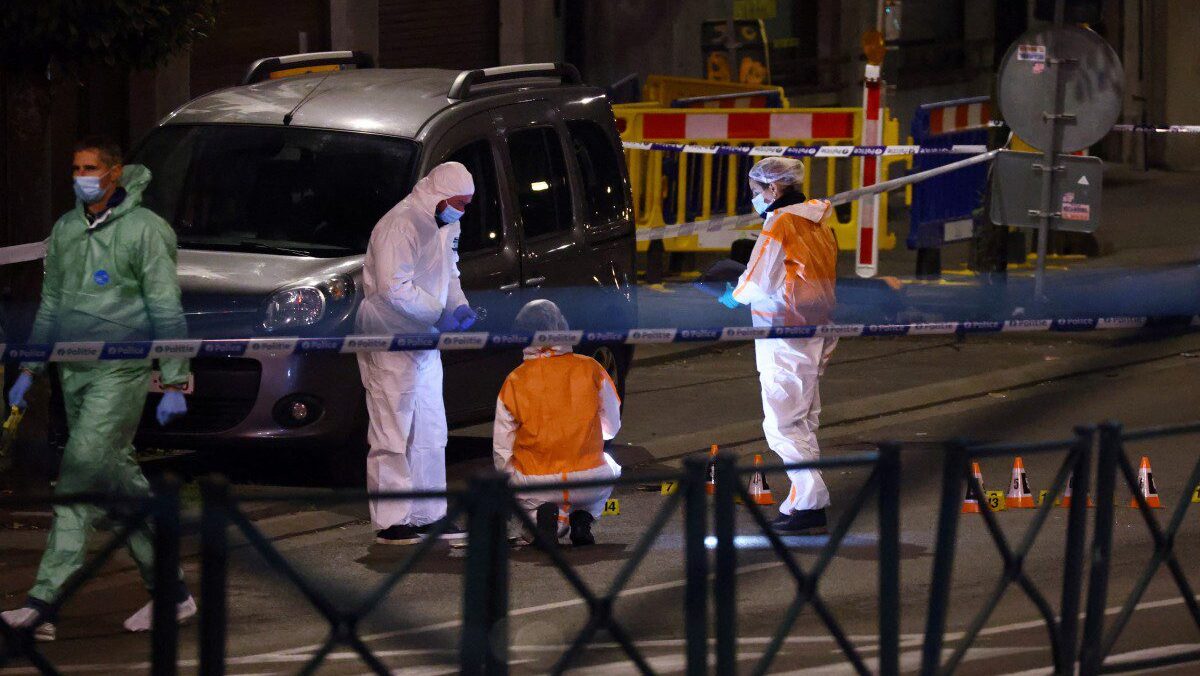
Belgian police investigate the scene of last week’s terror attack in Brussels.
Photo: Kenzo TRIBOUILLARD / AFP
The perpetrator of last week’s terror attack in Brussels was not only an illegal immigrant but also an escaped prisoner whose extradition file was ‘forgotten’ by Belgian authorities, Brussels Prosecutor General Johan Delmulle and Public Prosecutor Tim De Wolf confirmed in their joint press conference on Sunday (October 22nd), shifting the blame to the office being understaffed and calling the public backlash unfair.
As we previously reported, the gunman Abdesalem Lassoued’s home country, Tunisia, officially requested the criminal’s extradition in August 2022. Still, Belgian authorities—who had already flagged Lassoued as an extremist—failed to carry through with the process, a “monumental error” that led to Belgian Justice Minister Vincent Van Quickenborne’s resignation after the attack that left two Swedes dead.
The Brussels Prosecutor’s Office also confirmed that Tunis asked for Lassoued’s extradition because he in 2011 escaped a Tunisian prison where he had been serving a 26-year sentence since 2005. While the prosecutor’s office did not mention this, according to Agence French Presse, Lassoued was serving time for several attempted murders.
After he entered Europe through Lampedusa, Lassoued’s asylum request was rejected by Italy, Norway, Sweden, and lastly by Belgium, where he had been staying since 2020, despite a subsequent deportation order issued in March 2021.
Tunisia first alerted Brussels about the case in July 2022, followed by an arrest warrant and extradition request via Interpol in August, which the prosecutors say was finally booked in their office in September.
After registering the file in the system, however, the prosecutor’s office simply lost track of it. “None of the colleagues involved remember what became of this specific file a year ago. There is no trace of it being handled,” De Wolf said at the press conference, adding that it was probably forgotten in a cabinet.
Nonetheless, the officials think it’s unfair to blame the office for letting the extradition file gather dust, and Lassoued walk free, eventually leading to the terror attack.
Without naming the magistrate responsible for that specific file, Delmulle said it was “regrettable” that they now face public scrutiny and should be given the chance to defend themselves, promising a “thorough and objective examination of the events” and to ensure “a fair and balanced assessment.”
According to De Wolf, the main culprit is the lack of enough human resources. “The serious understaffing at the Brussels prosecutor’s office played a role, but … that doesn’t justify it,” the prosecutor said.
At the same time, Delmulle praised the “structural measures” implemented by the government to solve the problem the day before, bolstering the office with an additional five magistrates and expanding the staff of the Brussels judicial police with 50 new full-time positions.
The Brussels Prosecutor’s Office has long been complaining about being understaffed. Last month, Delmulle revealed that the number of cases dropped simply because of the office’s insufficient investigative capacity increased by 157% in the last five years.
The officials explained that the responsibility of the magistrate will be determined by the ongoing investigation. In case of minor fault, it’s up to Delmulle as the head of the office to decide on the sanction, but if major fault is found, the magistrate will be referred to the regional disciplinary court, where penalties range from withholding one’s wage to losing their job.
